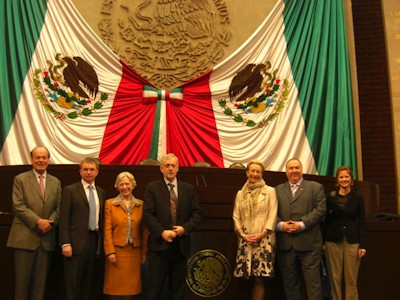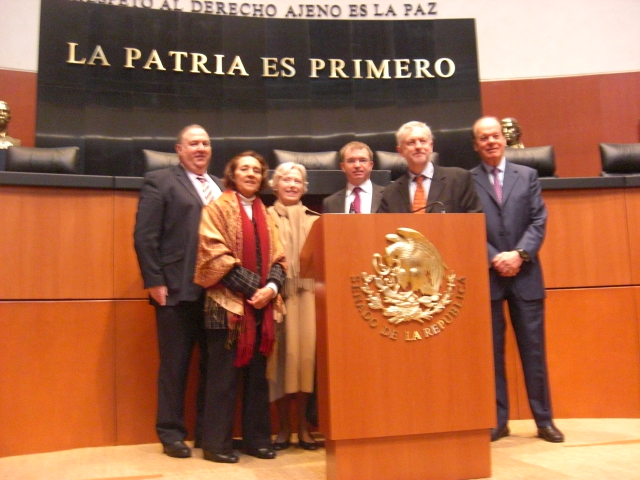

Outward delegation to Mexico
Government Issues
This is an election year in Mexico when in July there will be elections for President, Senate, Congress and many State Governorships. There is also an election for the crucial position of Mayor of Mexico City, where a quarter of the population of over 100 million people live.
The Mexican Constitution does not allow direct re-election; hence there is an enormous amount of transferring from Congress to senate to Mayor or Governor Positions. There are attempts to change this as some believe that re-election increases accountability, but such attempts have so far been unsuccessful.
The Presidential elections of 2006 were very controversial and eventually President Felipe Calderón was declared elected by a majority of 0.56 per cent; this led to months of protests with three million people taking part in protests.
There have been significant changes to electoral law, which were explained to us at a useful meeting with the electoral commission, including the requirements for a recount of all votes in the event of a less than 1 per cent difference between candidates. Observers are welcome from all over the world including the EU, Organisation of American States and independent organisations such as the Carter Centre. Our delegation hopes there will be full participation in the process by the International Community.
We had intensive meetings with the PAN (National Action Party) and PRD (Democratic revolutionary Party) as representatives of two of the three main political groupings. We also met and talked to many deputies and representatives of the PRI (Institutional Revolutionary Party) who have dominated Mexican politics ever since the adoption of the 1917 Constitution at the end of the revolution.
To understand Mexico it is essential to appreciate the Federal nature of the constitution and differences between states. There is also huge language and ethnic diversity within the country and tensions between Federal and State power.
Environment and Climate Change issues
Mexico has made huge efforts to support the Kyoto protocol and environmental protection issues, but with a rapidly growing population and huge demands of population there are huge issues to address.
Mexico City for example, has enormous waste disposal issues with the closure of a massive landfill site being imminent and a yet to be established major re-cycling centre not developed. There is a great deal of waste sorting already going on, but this needs to be expanded.
Transport systems rely on freight railways but overwhelmingly road transport and internal air transport. Mexico City has a rapidly developing Metro, Tram, Trolley Bus and Metro Bus system for which Mayor Ebrard and his predecessors are to be commended, as also the improving air quality in one of the world’s largest cities.
There are many discussions going on about solar, wind and wave power, all of which are very possible in the geography and topography of Mexico. Huge opportunities exist for UK companies with expertise and experience in this area.
Human Rights and Security
Since 2006 over 50,000 people have died in conflicts relating to drug movements through Mexico and conflicts with the Army and Police forces.
Mexico is a major drug route to the USA and quite rightly complains at the enormous drug consumption in the USA and ease of purchase of high calibre weapons in the US border towns. Many of the dead are very poor people including migrant workers, mainly women, from Central America.
There are issues of the 98 per cent impunity of the Armed Forces and structures and accountability of the Police Force. There is only 3 per cent chance of being detained for committing a crime. There are over 2,000 state and local Police forces and a better equipped and trained Federal Police Force. Issues of kidnapping abound. Efforts to reform local forces and amalgamate them are difficult. The Governor of Puebla told us that forced polygraph tests to existing officers had resulted in over 30 per cent failing and being dismissed.
The legal system was based on penal code law and is slowly developing a system of oral evidence and adversarial justice to both speed the process and reduce opportunities for corruption.
Additionally the Inter American Human Rights Court has demanded the end of impunity for the armed forces and this has been only partly addressed.
We were impressed with the determination of the civil society groups that we met to try and improve the situation and the bravery of human rights defenders and the impact of Javier Sicilia whose son was killed and has led a national protest march and united the families of many victims.
The activities of Peace Brigades International, The Bar Human Rights Council and Amnesty and Human Rights Watch are significant and very positive.
Economy, Trade and Investment
The UK trade with Mexico amounts to £800 million per year and is set to double by 2015 and enormous opportunities are there.
Over 80 per cent of Mexico’s international trade is with the USA and may well reduce in the future as trade with Europe and the rest of the world increases. Mexico is a member of NAFTA, has a Free Trade Agreement with Europe and has concluded many other such agreements and is also increasing trade with the rest of Latin America.
Mexico has a high level of unemployment, a very significant level of under employment and many working in the informal economy. It is much more successful economically than the Central American economies to the South and sees its future in developing trade both North to NAFTA buts also south and with Europe and Asia.
We were well briefed by the UK Embassy on UKTI strategy and were made well aware of the work of PROMEX, the Mexican Trade development group in the UK by a pre delegation briefing with the Ambassador Eduardo Medina-Mora Icaza.
Mexico’s huge infrastructure programme and development of new oil exploration by deep water drilling in the Gulf of Mexico presents huge challenges and opportunities for specialist companies.
Tourism is an enormous industry in Mexico, although most tourists visit only the Yucatan peninsula. 300,000 British tourists visit every year and we were interested in the views of the Puebla Government on expanding opportunities to all other areas of the country. Mexico City is one of the safest cities in Mexico and has enormous historical interests including the Anthropological Museum, one of the very best in the world. It has a remarkable collection of Aztec, pre Aztec and Spanish colonial history. Additionally superb narratives of Mexican independence and the murals and paintings of Diego Rivera and Frida Kalho abound.
There are many Mexican students in the UK and we met both a group of LSE Alumni, returned Chevening Scholars and many graduates from other UK Universities. Concerns were raised at the entry requirements to the UK, the necessity of providing financial securities and the loss of post graduation work opportunities as all being deterrents to studying in the UK. We agreed to discuss these matters with the UK Government.
Education
The UK is the second destination of choice for Mexicans studying abroad. The British Council is working closely with the private sector in promoting the link between academic institutions and industry on technology transfer and in launching a scheme to create business placements. The British Council also runs teacher training programmes ultimately giving the UK access to the 25.6 million students in primary and secondary schools in Mexico.
Our visit was intensive and very useful. We gained a good insight into the challenges and problems facing Mexico, but also the successes and achievements.
We are very appreciative of the great support we were given during our visit by staff at the UK Embassy and at Congress, Senate and many other institutions we were able to visit.
Delegation
Jeremy Corbyn MP (leader), Labour
Lord Davies of Stamford, Labour
Baroness Hooper CMG, Conservative
Mark Menzies MP, Conservative
John Robertson MP, Labour
Sophia Ostler, Assistant Secretary, British Group of the IPU
- The delegation was accompanied by Sophia Ostler from the IPU and, in Mexico, by Daniel Penny from the British Embassy. We were the guests of the Mexican Senate.
- This was a return visit from the Joint Senate and Congress delegation to the UK in 2011.
- Many thanks are due to the IPU office in London and the British Embassy and Ambassador Judith McGregor for their help and work in organising the visit. Special thanks are due to Sophia Ostler for her patience and efficiency and to Daniel Penny for his unrivalled knowledge of Mexican politics and political systems.
- The aim of the delegation was to represent the UK Parliament, understand Mexican issues in this election year, discuss trade, development, human rights and environmental issues, including energy and climate change. The delegation was very keen to understand the Federal nature of Mexico and thus travelled outside Mexico City to the State of Puebla.
- Many thanks are due to our Mexican hosts for their kindness and efficiency and willingness to openly discuss complex issues of trade, security, environment and Human Rights.
- The delegation fulfilled thirty appointments during the five days of the visit.













